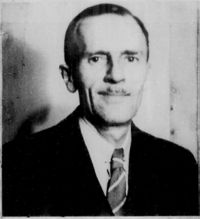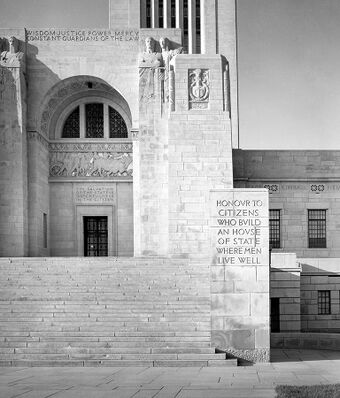Difference between revisions of "William Le Fevre Younkin (1885-1946), Architect"
m (→Buildings & Projects) |
m |
||
| Line 7: | Line 7: | ||
Following completion of the capitol, '''Younkin''' took a position as landscape engineer with the Nebraska Department of Roads and Irrigation, serving there from 1932-1945. In 1946 he returned to the capitol building to serve as lead custodian, a position he held until his death in December of that year. He was also named an architect member of the State Board of Examiners for Professional Engineers and Architects in 1946. The ''Lincoln Star'' characterized him as a man of few words, one who cherished the Nebraska Capitol Building, an architect, but one who loved trees and took pleasure in the open vistas of the landscapes, and was a competent technician who understood every step of construction.[[#References|[3]]] | Following completion of the capitol, '''Younkin''' took a position as landscape engineer with the Nebraska Department of Roads and Irrigation, serving there from 1932-1945. In 1946 he returned to the capitol building to serve as lead custodian, a position he held until his death in December of that year. He was also named an architect member of the State Board of Examiners for Professional Engineers and Architects in 1946. The ''Lincoln Star'' characterized him as a man of few words, one who cherished the Nebraska Capitol Building, an architect, but one who loved trees and took pleasure in the open vistas of the landscapes, and was a competent technician who understood every step of construction.[[#References|[3]]] | ||
| − | '''Younkin''' married Lucy Elenora Pettit on August 29, 1918, in Tucson, Arizona. Pettit died in 1919, after the couple had one daughter, Margaret Pettit. His second marriage was to Marion Lincoln Hussey on March 12, 1921, at Stamford, Connecticut. The couple had two children, Robert Le Fevre and Bertram. Younkin was a member the American Institute of Architects, vice-president of the Nebraska Chapter of the AIA, and a member of the Lincoln Engineers Club, Artists Guild, Nebraska Art Association, University Club, Alpha Chi Rho, and Eastridge Country Club.[1] He died December 18, 1946, at the age of 61.[[#References|[2]]] | + | '''Younkin''' married Lucy Elenora Pettit on August 29, 1918, in Tucson, Arizona. Pettit died in 1919, after the couple had one daughter, Margaret Pettit. His second marriage was to Marion Lincoln Hussey on March 12, 1921, at Stamford, Connecticut. The couple had two children, Robert Le Fevre and Bertram. Younkin was a member the American Institute of Architects, vice-president of the Nebraska Chapter of the AIA, and a member of the Lincoln Engineers Club, Artists Guild, Nebraska Art Association, University Club, Alpha Chi Rho, and Eastridge Country Club.[[#References|[1]]] He died December 18, 1946, at the age of 61.[[#References|[2]]] |
This page is a contribution to the publication, '''[[Place Makers of Nebraska: The Architects]]'''. See the [[Format and contents of Nebraska architect entries|format and contents]] page for more information on the compilation and page organization. | This page is a contribution to the publication, '''[[Place Makers of Nebraska: The Architects]]'''. See the [[Format and contents of Nebraska architect entries|format and contents]] page for more information on the compilation and page organization. | ||
| Line 72: | Line 72: | ||
6. ''The Oculus: Bimonthly Newsletter of AIA Nebraska'' 2001:4 (July-August 2001): [4]. Accessed March 20, 2016. http://www.aiane.org/downloads/ne-architect/2001/01July_Aug.pdf | 6. ''The Oculus: Bimonthly Newsletter of AIA Nebraska'' 2001:4 (July-August 2001): [4]. Accessed March 20, 2016. http://www.aiane.org/downloads/ne-architect/2001/01July_Aug.pdf | ||
| + | |||
| + | 7. Matthew G. Hansen, AIA, "Chronology and Compiled Research Notes about William LeFevre Younkin," ''TS''. (n.d., received February 25, 2016) | ||
==Page Citation== | ==Page Citation== | ||
Revision as of 12:53, 24 March 2016
William L. Younkin was born in Iowa City, Iowa on November 20, 1885, to William Melville and Susan Gamble Le Fevre Younkin. He graduated from San Diego High School in 1907, and soon began working as an architectural draftsman with firms in San Francisco and San Diego, California. He attended architectural school at Columbia University in New York from 1914-1917, and thereafter became an architect and draftsman with Bertram Grosvenor Goodhue (1869-1924), Architect, in New York.[1] Except for two years in Arizona, Younkin worked for Goodhue in New York from 1915-1922, then moved to Lincoln where he superintended construction of Goodhue’s capitol on behalf of Goodhue, the Goodhue Associates, and the Nebraska Capitol Commission.[1] He held that position until 1932.
Following completion of the capitol, Younkin took a position as landscape engineer with the Nebraska Department of Roads and Irrigation, serving there from 1932-1945. In 1946 he returned to the capitol building to serve as lead custodian, a position he held until his death in December of that year. He was also named an architect member of the State Board of Examiners for Professional Engineers and Architects in 1946. The Lincoln Star characterized him as a man of few words, one who cherished the Nebraska Capitol Building, an architect, but one who loved trees and took pleasure in the open vistas of the landscapes, and was a competent technician who understood every step of construction.[3]
Younkin married Lucy Elenora Pettit on August 29, 1918, in Tucson, Arizona. Pettit died in 1919, after the couple had one daughter, Margaret Pettit. His second marriage was to Marion Lincoln Hussey on March 12, 1921, at Stamford, Connecticut. The couple had two children, Robert Le Fevre and Bertram. Younkin was a member the American Institute of Architects, vice-president of the Nebraska Chapter of the AIA, and a member of the Lincoln Engineers Club, Artists Guild, Nebraska Art Association, University Club, Alpha Chi Rho, and Eastridge Country Club.[1] He died December 18, 1946, at the age of 61.[2]
This page is a contribution to the publication, Place Makers of Nebraska: The Architects. See the format and contents page for more information on the compilation and page organization.
Contents
Educational & Professional Associations
1900-1907: San Diego High School, San Diego, California.[1][5]
1910-1912: draftsman, George W. Kelham, Architect, and McDonald & Applegarth, Architects, San Francisco, California.[1]
1912-1914: draftsman, Bristow & Lyman, Architects, San Diego, California.[1][5]
1914-1916: architecture student, Columbia University, New York.[5]
1915: draftsman, William Weller Bosworth, Architect, New York, New York.[5]
1915-1917: draftsman, Bertram Grosvenor Goodhue, Architect, New York, New York.[5][a]
1917-1918: draftsman, J. B. Lyman, Architect, Tucson, Arizona.[5][b]
1918-1919: engineer, New Cornelia Copper Company, Ajo, Arizona.[5]
1919-1922: architect and draftsman, Bertram Grosvenor Goodhue, Architect, New York, New York.[1][5]
1922-1934: supervising architect, Nebraska State Capitol Commission, Lincoln, Nebraska.[1][5][d]
1930-1931: president, AIA Nebraska.[6]
1934-1945: landscape engineer, Nebraska Department of Roads and Irrigation, Lincoln, Nebraska.[5][e]
1938: Registered Professional Architect, Nebraska, A-18, February 8, 1938.[5]
1946: architect member, Nebraska State Board of Examiners for Engineers and Architects.
1946: custodial architect, State Capitol, Lincoln, Nebraska.
Buildings & Projects
Superintendent of construction, Nebraska State Capitol, Lincoln, Nebraska.[1][4][5][c]
Notes
a. In Baldwin (1928), Younkin gives the dates as 1916-1918.[1]
b. In Baldwin (1928), Younkin gives the date 1918 as working with the State Architect, in Tucson, Arizona.[1]
c. Functioning as Supervising Architect for the Nebraska Capitol Commission.[1][5]
d. City directories vary as to job title, ranging from architect and clerk of the works for the Capitol Commission (1922), representative of Bertram G. Goodhue Associates (1925), resident architect and general superintendent of construction (1926-1928), and supervising architect (1923, 1931-1933), etc.
e. City directories vary as to job title, from architect (1934), engineer (1935-1937, 1945), and landscape engineer (1938-1942).
References
1. “William Le Fevre Younkin,” in Sara Mullin Baldwin (ed). Who’s Who in Lincoln, 1928. Lincoln: Robert M. Baldwin, 1928, p.234.
2. AIA Historical Directory of American Architects: A Resource Guide to Finding Information About Past Architects. http://communities.aia.org/sites/hdoaa/wiki/Wiki%20Pages/ahd1050136.aspx Accessed, August 17, 2010.
3. “William Younkin,” Lincoln Star (December 19, 1946): 6:1.
4. “Wm. Younkin, Architect on Capitol, Dies,” Lincoln Star (December 18, 1946): 1:5.
5. Application for Registration to Practice Professional Engineering and Architecture, Nebraska State Board of Examiners for Professional Engineers and Architects, December 4, 1937. Nebraska State Historical Society, RG081 SG2.
6. The Oculus: Bimonthly Newsletter of AIA Nebraska 2001:4 (July-August 2001): [4]. Accessed March 20, 2016. http://www.aiane.org/downloads/ne-architect/2001/01July_Aug.pdf
7. Matthew G. Hansen, AIA, "Chronology and Compiled Research Notes about William LeFevre Younkin," TS. (n.d., received February 25, 2016)
Page Citation
D. Murphy, “William Le Fevre Younkin (1885-1946), Architect,” in David Murphy, Edward F. Zimmer, and Lynn Meyer, comps. Place Makers of Nebraska: The Architects. Lincoln: Nebraska State Historical Society, February 10, 2015. http://www.e-nebraskahistory.org/index.php?title=Place_Makers_of_Nebraska:_The_Architects Accessed, December 13, 2025.
Contact the Nebraska State Historic Preservation Office with questions or comments concerning this page, including any problems you may have with broken links (see, however, the Disclaimers link at the bottom of this page). Please provide the URL to this page with your inquiry.

